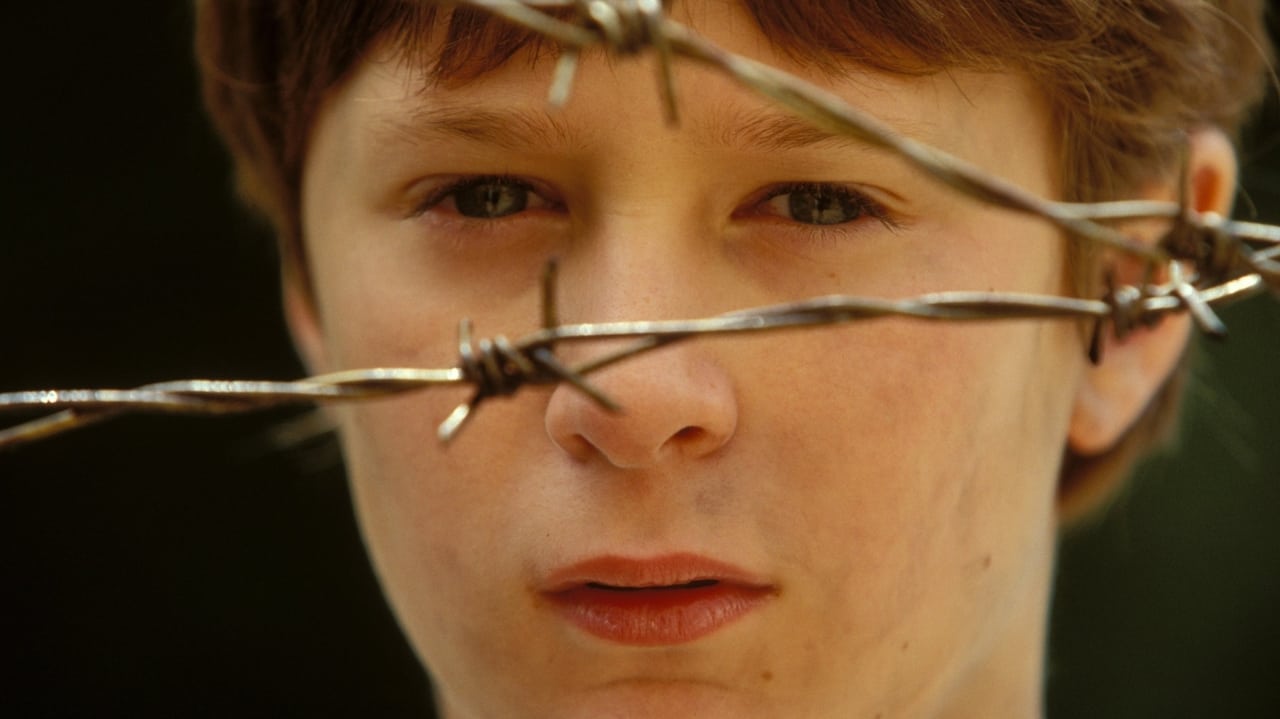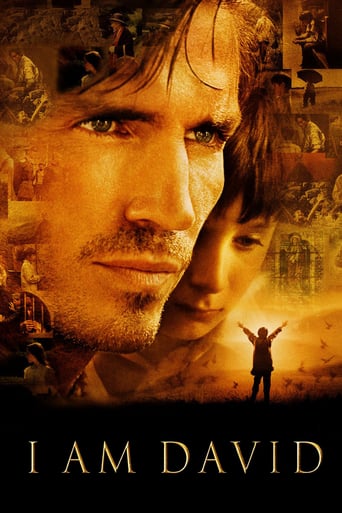

The greatest movie ever made..!
... View MoreStrong and Moving!
... View MoreThe first must-see film of the year.
... View MoreThe story, direction, characters, and writing/dialogue is akin to taking a tranquilizer shot to the neck, but everything else was so well done.
... View MoreI Am David is a film based on the novel of the same title,originally published in the USA under the name "North to Freedom",by Anne Holm. It stars Jim Caviezel,Ben Tibber and Joan Plowright.The story is about a young boy that is sent on a remarkable odyssey as he flees a Communist prison camp set in Eastern Europe in the early 1950's.Seven years after World War II, a 12-year old boy named David escapes a Stalinist Labor camp in Bulgaria where he has spent his entire life. He sets out on a risky journey to Denmark, initially believing he is on an important mission to deliver a letter, but eventually discovering that the "mission" was to reunite him with his mother, of whom he only has faint memories. Along his journey, he faces danger, fear, loneliness, hunger, and encounters various people.Johannes, his friend and mentor in the camp, who prepares him for escape, is killed by a guard, leaving David to face escape on his own. David is helped by a guard to escape, who gives him a compass and tells him he must go southwest to Greece, take a boat to Italy and finally go north to Denmark, a peaceful and neutral country. Since David was locked in a camp all his life, he has repressed feelings and trusts no one, and so feels lost and disoriented in the world.Along his journey, though he is mistreated by some people, he is well- treated by others. Gradually he learns that some people can be trusted, and to open up and experience his own feelings. Finally, with the help of decent people whom he has learned to trust, David and his mother are reunited.Although it is not that of a brilliant film,the viewer cannot resist liking and being moved by it.It shows how a spirit of a young boy manages to accomplish his "mission" which in a way will affect people facing great problems and obstacles in life.Overall,one cannot be affected by this heartwarming tale.
... View MoreI watched this movie twice now and both times I missed the beginning. But the rest of what I saw was so heartwarming that I will keep looking for it to see it in it's entirety. My heart was traveling right along with young David. I felt his pain and his desire to share everything with Sophie. Since it wasn't part of the storyline, I decided to think that when David met up with his mom, the two of them traveled back to see his adopted "Grandma Sophie" who had been so touched by this young man as well. How refreshing to see such high quality work on a movie that isn't centered around obvious violence for any length of time but just enough for you to appreciate David's life, and not filled with sex and foul language. What a joy! What a winning story!
... View MoreThe movie definitely took some liberties. It is quite different. The similarities is basically the major thing. The striking the match plan is the same, as well where his bundle is and his trip to Denmark. Except that the bundle comes with soap, for which he asked for in the book, he starts in Bulgaria and travels to Salonica by hiding in a truck and he gets caught on a fence to add suspense. Also, he has to bring an envelope along with him. The sailor finds hims and gives him a life vest, but he has to trade his knife. He gets to land and discovers beauty, as in the book. He then goes into to town where he makes up the circus story for a baker. Then the baker tells him about St. Elizabeth and asks him to smile for bread. In the book, he was first asked to smile by the old British couple, who are not in the movie. Then, the baker calls in cop on him and he barely gets away. Something the screenwriter decided should happen. He also doesn't get his free bread. Then in a flashback, we find that Johannes is shot. Something else different. This is when David decides he should have a god. Not when he loses his compass though. Plus his choice is St. Elizabeth, no the god of still water ad green pastures. This completely eliminates the conversation with the priest which was an interesting part in the book. His first job he is given in the movie is by and old woman who wants him to deliver wine to a party. Which of course, never happened in the book. He then tries to buy stuff in a store but is shooed off, which never happened in the book either. It's here, I should mention that it keeps true to the book by showing him learning from Johannes. Then kind of ruins it by having him remember his mom and being brought here. That destroys David finding himself, as he already knows what happened. Finally, something in the book happens. He meets the American couple who need gas. He does not resent them though and deny their money, later finding it. He just takes it. Then the fight with Carlo happens and he then rescues Maria form the barn. Hear come more differences. He does not have a conversation right after and there is no Andrea. He does learn about the globe and silverware, as in the book. And when he's leaving, he contemplates taking soap, but that's it for similarities for now. He actually has a confrontation with the parents, instead of leaving a letter. He also leaves without knowledge of Maria. That is so crucial, because this is when David first voluntarily hugs somebody. Later on he never sees the newspaper ad or learns not to hate Carlo and writes the apology letter. Then another entirely made up scene comes. There's a riot in the street and David get locked up because an officer thought he threw a rock at him. He does manage to escape. He then does get a lift to his next destination. But, it's from the sailor he met, not the Italian lorre driver. He then meets the artist who paints him. They're driving to her house when they are stopped at the border where David is nearly found out. As you can see, the director obviously thought it needed more close calls. We also find out Sophie's last name is Anderson, not Bang. When they get her house, his strange eyes are mentioned. What seemed to be a major part of the book and David's character, they are mentioned once. Sophie has a dead son backstory and a cat, both not mentioned in the book. Unlike the book, he stays the night. He goes to a store with Sophie and finds out about his mom by a book, not by Sophie being good friends with her. Then, in a scene change, he is boarding an airplane to Denmark to see his mom. This COMPLETELY skips out his incident with the farmer. He also never meets his faithful companion King, who taught David dogs are smart, brave and trustworthy. It also skips his treacherous trip through Germany. He just flies straight to his mommy. The End. I liked the book "I Am David," but I like it even more now. Sometimes a lousy movie can enhance your reading experience. The book gives so much more insight from David's point of view and more meaningful storyline. The only big problem I had with the book was the ending, but the movie does even less for the ending. It's like they ran out of budget. The plot is just changed so much, it's barely and adaption. The book is far superior. Book rating: 7/10 Movie rating: 3.5 out of 10
... View MoreThe historical basis of brutal deprivation and summary shootings in a post-WW2 Bulgarian prison camp is uncertain. Director-actor Paul Feig nonetheless portrays a Nazi-style horror with slave-camp beatings and a summary shooting over a bar of soap. It matters not whether this is Communist or Nazi, it is just evil, out there somewhere.For some unknown reason, one of the psychotics running the camp decides to help a boy (David, Ben Tibber) to escape, giving him his ID papers in an envelope and telling him to take the envelope to Denmark, without telling him why or what it contains. This preposterous premise should signal that we are in a silly scenario that cannot be taken seriously.This is further reinforced when David, who is presumably Danish, has no difficulty communicating with the multiple language-speakers he encounters on his trip. These days, such nonsense could only come from an American, and Paul Feig acts in his own film in the most absurd scene of all, when, playing an English-speaker, he gropes for Italian to talk to David, who has been talking English throughout. Real Europeans now use sub-titles and genuine languages.David's expressionless journey through a non-specific rural Italy into the arms of a non-specific Swiss resident is strictly for the hankie-clutchers who have no disbelief to suspend. I'm afraid mine reared up in outrage when the film showed a uniformed policeman with his cap on in church, something unthinkable that Paul Feig doesn't know, although he was willing to lard the scene with a bellowing church choir, and drape the Swiss village with happy well-adjusted cousins of the Von Trapp family.When David finds a book with his mother's picture on the back and makes a gee-whizz expression we know the resolution is nigh, and with the help of the Swiss national air-line, he is reunited with the bitch who wbo abandoned him in the torture camp, sorry, his ever-loving and faithful mother. Feig is true to style when he shows a seated airplane passenger wearing a fedora. For hankie-clutchers only: normal viewers avoid with care.
... View More